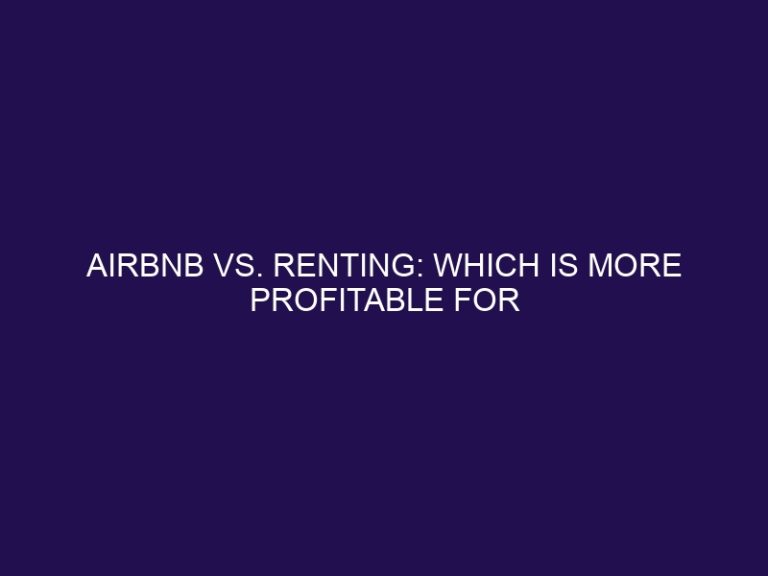Questions Every Landlord Should Ask Applicants Before They Sign A Lease
Before signing a lease with a potential tenant, it is crucial for landlords to conduct a thorough screening process to ensure the suitability and reliability of the applicants. Proper screening can help landlords avoid potential problems and ensure a smooth rental experience. Here, we will discuss the importance of screening potential tenants and the questions every landlord should ask before signing a lease.
Screening potential tenants is essential to protect the interests of landlords and maintain the quality of their rental property. By asking the right questions, landlords can gather valuable information about the applicants’ backgrounds, financial stability, and rental history, allowing them to make an informed decision. This screening process helps filter out applicants who may have a history of evictions, financial difficulties, or other red flags that could lead to problems down the line.
To ensure a successful tenancy, landlords should ask the following questions before signing a lease:
1. Can You Provide Proof of Income?
2. Have You Ever Been Evicted?
3. Can You Provide References from Previous Landlords?
4. Do You Have Any Pets?
5. How Many People Will Be Living in the Rental Property?
6. What is Your Employment Status?
7. Have You Ever Violated a Rental Agreement?
8. Do You Smoke?
9. Have You Had Any Criminal Convictions?
10. Do You Have Renter’s Insurance?
These questions cover essential aspects such as income verification, rental history, pet policies, occupancy limits, and potential risks related to the applicant’s behavior and background. Collecting this information allows landlords to make an informed decision about whether the applicant is a suitable fit for the rental property.
In addition to the questions, landlords should also consider following local fair housing laws to ensure equal treatment of all applicants. It is advised to consult legal professionals or rental association guidelines to ensure compliance with legal requirements and avoid discrimination.
Lastly, while the screening process is essential, trusting your gut instinct is also crucial. Personal interactions and observations during the application process can provide valuable insights into an applicant’s character and reliability. Landlords should consider their instincts and use their judgment to make the best decision possible.
By conducting thorough tenant screenings and asking the right questions, landlords can find trustworthy and responsible tenants who will maintain the rental property, fulfill their financial obligations, and create a positive rental experience for both parties involved.
The Importance of Screening Potential Tenants
Finding the right tenants for your rental property is crucial for a smooth and hassle-free experience as a landlord. In this section, we’ll dive into the importance of screening potential tenants and why it should be a top priority. From the initial contact of rental listings to critical tenant screening questions, we’ll explore various aspects of tenant screening that can help you make informed decisions. So, buckle up and get ready to discover the steps and considerations that go into finding reliable and responsible tenants for your property.
Rental listing and initial contact
Creating an effective rental listing and initial contact is crucial for attracting qualified tenants. Here are some important steps to consider:
- Write a compelling listing description highlighting key features and amenities of the rental property.
- Include high-quality photos to showcase the property’s appeal.
- Provide accurate and detailed information about the rental price, lease terms, and any additional fees.
- Use multiple channels, such as online rental platforms and social media, to maximize visibility.
- Respond promptly to inquiries and schedule property viewings promptly.
Remember, a well-crafted rental listing and a professional initial contact can make a significant difference in attracting reliable tenants who are genuinely interested in your property.
Rental application and basic information
When considering potential tenants, the rental application and basic information play a vital role in the assessment of their eligibility. Here is a step-by-step guide:
- Create a rental application form that includes sections for personal details, employment information, and references.
- Request applicants to provide essential documentation such as ID, proof of income, and previous rental history.
- Gather fundamental information like their full name, contact details, and current address.
- Verify employment specifics, including job stability and income level.
- Evaluate creditworthiness by obtaining a credit report or credit score.
- Contact previous landlords to validate rental history and acquire references.
- Conduct thorough background checks to identify any eviction records or criminal history.
- Discuss pet restrictions and parking arrangements to ensure they align with the applicant’s requirements.
- Include crucial tenant screening questions in the application form to gather relevant information..
- Take into consideration additional factors such as the number of occupants, smoking habits, and renter’s insurance.
Employment verification and income verification
When screening potential tenants, one crucial step is to conduct employment verification and income verification. This process involves confirming the current employment status, assessing the stability of their income, and evaluating their ability to afford the rental property. Therefore, landlords should actively request documentation, such as pay stubs, employment letters, or bank statements, as proof of income. By verifying both the employment and income, landlords can ensure that tenants possess a reliable source of income to meet their financial obligations. This step plays a vital role in determining the tenant’s financial stability and their capacity to pay the rent on time.
Checking credit worthiness and credit score
- Checking the credit worthiness and credit score of potential tenants is an essential part of the screening process for landlords. It helps landlords assess the financial responsibility and reliability of tenants. Here are some important points to consider:
- Request permission: Before conducting a credit check, landlords must obtain written consent from the applicant.
- Review credit history: Examine the applicant’s credit report to evaluate their payment history, outstanding debts, and any previous bankruptcies or collections.
- Check credit score: The credit score provides a numerical representation of the applicant’s creditworthiness. A higher score indicates a lower risk of defaulting on payments.
- Consider Debt-to-Income Ratio: Assess the applicant’s debt levels compared to their income to determine their ability to meet their financial obligations.
- Look for red flags: Pay attention to any patterns of late payments, excessive debt, or outstanding judgements that may indicate a higher risk tenant.
Remember, while credit history is an important factor, it should be evaluated in conjunction with other screening criteria to make an informed decision about potential tenants.
Just like with credit checks, verifying rental history is crucial to ensure a smooth rental experience. Contacting previous landlords can provide insights into an applicant’s rental behavior, such as their payment history, how they maintained the property, and their overall reliability as a tenant. It’s important to ask for references from previous landlords and contact them to gather relevant information.
By conducting thorough tenant screening, including checking credit worthiness and credit score and rental history verification, landlords can minimize the risk of potential problems and cultivate a positive and stable renting environment.
Rental history verification and positive reference checks
Rental history verification and positive reference checks are vital steps in the tenant screening process. Here is a comprehensive list of steps to follow:
-
Contact previous landlords: Reach out to the applicant’s previous landlords to verify their rental history, including the length of tenancy, payment history, and any issues during their stay, as a part of the rental history verification process.
-
Check for positive references: Request references from both personal and professional contacts to gain insights into the applicant’s character, reliability, and ability to maintain a good relationship with others. These positive reference checks are important to evaluate the applicant.
-
Verify employment details: Contact the applicant’s employer to confirm their employment status, income, and stability, which can indicate their ability to pay rent on time. This step is crucial during the rental history verification process.
-
Consider additional references: If the applicant doesn’t have sufficient rental history, you can also request references from neighbors or colleagues who can vouch for their character and responsibility. These additional reference checks can provide valuable information about the applicant.
Eviction report and criminal background check
Performing an eviction report and criminal background check is crucial when screening potential tenants. This step helps protect your property and ensures the safety of other tenants.
- Conducting an eviction report allows you to look for any past evictions or history of late rent payments, which may indicate a potential risk.
- A thorough criminal background check is essential to verify if the applicant has any criminal convictions or charges, especially those related to violence or property damage.
- When reviewing the findings, it is important to consider the severity and recency of any incidents. It is advisable to seek guidance from legal professionals to fully comprehend how these factors can impact your decision.
Pet restrictions and parking arrangements
When choosing tenants, landlords must take into account both pet restrictions and parking arrangements to create a harmonious living environment. Here are some factors to consider:
- Pet Restrictions: It is crucial for landlords to clearly communicate any limitations on pet types, sizes, and breeds in the rental agreement. By doing so, conflicts between tenants with allergies or fears of specific animals can be avoided.
- Parking Arrangements: Landlords should assess the availability of parking spaces and provide comprehensive rules and regulations regarding parking. This step prevents disputes among tenants and ensures an organized parking system.
Asking critical tenant screening questions
Tenant screening is an essential part of the rental process. Landlords should ask questions about proof of income, previous evictions, references from previous landlords, pet ownership, number of occupants, employment status, rental agreement violations, smoking habits, criminal convictions, and renter’s insurance. These questions help landlords assess the suitability and reliability of potential tenants. Landlords should follow local fair housing laws, consult with legal professionals if needed, and trust their instincts when making decisions. Asking critical tenant screening questions ensures that landlords choose responsible and trustworthy tenants for their rental properties.
Additional considerations for tenant screening
When conducting tenant screening, it is important to take into account additional considerations for tenant screening. These factors can assist you in making well-informed decisions and finding the most suitable tenants for your rental property.
1. Rental property policies: It is crucial to assess whether the potential tenant’s lifestyle and behavior align with the rules and regulations of your property, including any pet restrictions or parking arrangements.
2. Communication skills: Evaluating the tenant’s ability to effectively communicate and address any concerns or issues that may arise during their tenancy is essential.
3. Financial stability: In addition to basic income verification and credit checks, it is advisable to delve deeper into the tenant’s financial situation to ensure they have a stable financial foundation that enables them to consistently meet their rental obligations.
4. Compatibility with other tenants: If there are existing tenants on the property, it is important to consider how well the potential tenant will fit in with the current community to maintain a harmonious living environment.
5. Long-term suitability: It is worth considering whether the tenant is seeking a long-term rental and whether their goals for the property align with your own.
By taking these extra factors into account during tenant screening, you can secure tenants who are not only financially reliable but also a great fit for your rental property.
Questions Every Landlord Should Ask Before Signing a Lease
Before signing a lease, every landlord should ask a series of questions to ensure a successful and smooth tenancy. These essential questions are:
- Can you provide references from previous landlords or employers?
- What is your monthly income and can you provide proof of employment?
- Have you ever been evicted or had issues with previous landlords?
- Do you have any pets?
- What is your preferred lease term and move-in date?
- Are you willing to undergo a background and credit check?
- What is your reason for moving?
- Can you provide proof of renter’s insurance?
- Will you be sharing the unit with anyone else?
Asking these important questions is crucial for landlords in evaluating the suitability of applicants and establishing a positive landlord-tenant relationship.
Can You Provide Proof of Income?
When evaluating potential tenants, it is crucial to ask, “Can you provide proof of income?” This inquiry is vital in order to ensure that the tenant possesses a stable source of income and can financially afford to pay rent. Requesting documents such as pay stubs or bank statements can aid in verifying the tenant’s financial capability. It is of utmost importance to establish a minimum income requirement to guarantee that the tenant’s earnings are adequate to cover the rent. By acquiring proof of income, landlords can make well-informed decisions and choose tenants who demonstrate financial responsibility and dependability.
Have You Ever Been Evicted?
When screening potential tenants, one crucial question to ask is, “Have you ever been evicted?” This inquiry helps landlords evaluate the applicant’s rental history and reliability as a tenant. If a prospective tenant has experienced eviction in the past, it could indicate a recurring trend of non-payment, property damage, or other problematic conduct. Landlords aim to ensure they select tenants who will be responsible and considerate of the property. Inquiring about eviction history constitutes an essential step in the tenant screening process to choose reliable and trustworthy tenants.
Can You Provide References from Previous Landlords?
Obtaining references from previous landlords is an essential step in the tenant screening process for landlords. By asking potential tenants, “Can You Provide References from Previous Landlords?“, landlords can gain valuable insights into the tenant’s past rental history and behavior. This information can help determine whether the tenant is reliable and responsible, and whether they have a positive track record of paying rent on time and taking care of the property. Asking for references from previous landlords ensures that landlords have a better understanding of the tenant’s rental history and can make an informed decision about their suitability as a tenant.
Do You Have Any Pets?
Having pets is a crucial consideration when screening potential tenants for a rental property. Here are a few points to consider:
-
Do You Have Any Pets? Check if the tenant has pets and if so, inquire about the type, size, and number of pets.
-
Do You Have Any Pets? Ask about any pet-related regulations or restrictions in the rental property, such as breed restrictions or weight limits.
-
Do You Have Any Pets? Inquire about the tenant’s plan for taking care of the pets, including arrangements for feeding, exercise, and waste disposal.
-
Do You Have Any Pets? Consider requesting a pet deposit or additional pet-related fees to cover any potential damages caused by the pets.
-
Do You Have Any Pets? Review the tenant’s rental history to see if there were any previous issues related to pets, such as damage to the property or noise complaints.
It is important to strike a balance between accommodating tenants with pets and ensuring the safety and well-being of the rental property.
How Many People Will Be Living in the Rental Property?
Considering the number of people who will be living in the rental property is an important aspect of tenant screening. It helps ensure that the property is suitable for the number of occupants and that it complies with occupancy limits and local regulations.
- Occupancy Limits: Verify if the number of occupants meets the legal requirements and restrictions for the property.
- Space and Amenities: Assess if the property can comfortably accommodate the number of people, with adequate bedrooms, bathrooms, and living spaces.
- Utilities and Resources: Consider the impact on utilities and resources, such as water, electricity, and parking availability, to ensure they can meet the needs of all residents.
Story:
A landlord once rented a two-bedroom apartment to a couple without inquiring about how many people will be living in the rental property. To their surprise, the couple had three children and later moved in a relative. The apartment became overcrowded, causing strain on resources and complaints from neighbors. It highlighted the importance of clarifying the number of occupants during the screening process.
What is Your Employment Status?
When screening potential tenants, it is crucial to inquire about their employment status. This helps determine if they have a stable source of income to afford the rent. Landlords should ask applicants questions such as “What is your current employment status?” or “Are you currently employed?” This allows them to verify the applicant’s employment and income details. It is important to assess if the applicant is employed full-time, part-time, or self-employed. Landlords may ask for proof of income, such as recent pay stubs or employment letters, to further validate the applicant’s employment status.
Have You Ever Violated a Rental Agreement?
When screening potential tenants, it is crucial to consider whether they have ever violated a rental agreement. Therefore, it is important to ask the applicants, “Have you ever violated a rental agreement?” This inquiry helps assess their past behavior and reliability, enabling landlords to determine if the applicant is likely to adhere to the lease terms and maintain a positive relationship with the landlord. By posing this question, landlords can identify any red flags and make well-informed decisions regarding the suitability of the applicant for the rental property.
Do You Smoke?
When evaluating potential tenants, it is crucial for landlords to inquire about their smoking habits. This inquiry helps landlords establish whether smoking will be permitted within the rental property and if any restrictions exist. Smoking can cause property damage and raise concerns for other tenants. By posing this question upfront, both the landlord and tenant can ensure they are aligned with the smoking policies. A helpful tip: If smoking is prohibited, including a clause in the lease agreement that outlines penalties for smoking violations is advisable.
Have You Had Any Criminal Convictions?
It is crucial for landlords to ask potential tenants, “Have you had any criminal convictions?” This helps ensure the safety and security of the rental property and other tenants. By asking this question, landlords can assess the potential tenant’s history and determine if there are any red flags that may pose a risk. Landlords can also have a better understanding of the tenant’s reliability and trustworthiness. Ultimately, asking about criminal convictions allows landlords to make informed decisions and protect their property. For example, a landlord might discover that a potential tenant has a history of theft or vandalism, indicating they may not be a responsible tenant.
Do You Have Renter’s Insurance?
Do You Have Renter’s Insurance? Renter’s insurance is an important consideration for both tenants and landlords. Here are a few reasons why tenants should have renter’s insurance:
- Protection: Renter’s insurance can protect tenants from financial loss due to theft, fire, or natural disasters.
- Liability coverage: It can also provide liability coverage if a visitor gets injured in the rental property.
- Peace of mind: With renter’s insurance, tenants can have peace of mind knowing that their personal belongings are covered.
True story: A tenant without renter’s insurance had a fire in their apartment, causing significant damage to their belongings. Without insurance, they had to bear the cost of replacing everything themselves, causing a financial burden that could have been avoided.
Follow Local Fair Housing Laws
To ensure compliance with local fair housing laws, landlords must follow the guidelines set forth in these regulations during the tenant screening process. These laws serve to protect individuals from discrimination based on race, color, religion, sex, national origin, familial status, and disability. It is crucial for landlords to be fully aware of these laws and actively ensure that their screening practices adhere to them. This entails treating all applicants equally, employing consistent criteria, and avoiding any form of discriminatory practices. If necessary, landlords can turn to local housing authorities or seek advice from legal professionals to ensure their compliance. By diligently following local fair housing laws, landlords can establish a rental environment that is fair and inclusive to all applicants.
Consult with Legal Professionals
When it comes to tenant screening, it is imperative for landlords to consult with legal professionals in order to ensure they adhere to local fair housing laws and fully comprehend their rights and responsibilities. The guidance provided by legal professionals can prove invaluable in evaluating the legality of specific screening practices, assisting in the creation of a comprehensive rental application, and offering advice on potential red flags to be mindful of during the screening process. Through the act of consulting with legal professionals, landlords are equipped to confidently navigate the intricate aspects of tenant screening and effectively reduce the risk of encountering legal issues or facing discrimination claims.
Trust Your Gut Instinct
As a landlord, it’s crucial to trust your gut instinct when screening potential tenants. Trusting your gut can help you assess the character of a tenant by picking up on subtle cues and behaviors that may indicate responsibility, respectfulness, and reliability. It also aids in making tough decisions by preventing potential issues down the line if something feels off or raises red flags during the screening process. Additionally, trusting your gut provides peace of mind. When you have a good feeling about a tenant, it gives you confidence in your decision and helps establish a positive landlord-tenant relationship. However, it’s important to remember that while trusting your gut instinct is significant, it should always be used in conjunction with thorough tenant screening procedures.
Frequently Asked Questions
1. What factors should landlords consider when screening potential tenants?
Landlords should consider several factors when screening potential tenants to ensure they find the best possible renter. These factors include a good credit score, clean eviction report, steady employment history, positive reference checks, and a monthly income that is three times the rent. By conducting these critical checks, landlords can gather information about an applicant’s financial health, rental history, and suitability for the property.
2. How can landlords save time during the tenant screening process?
Landlords can save time during the screening process by stating their leasing criteria upfront in rental advertisements. This can include pet restrictions, parking arrangements, and other screening criteria. By setting expectations upfront, landlords can attract a smaller but more qualified pool of applicants, saving time and energy in reviewing applications that don’t meet their requirements.
3. What are the top tenant screening questions landlords should ask?
Some of the top tenant screening questions landlords should ask potential applicants include:
1. What date would you want to move in?
2. How long do you plan on staying?
3. How many people will be living in the rental?
4. Do you have any pets?
5. Have you ever been evicted?
6. Can you provide references from previous landlords?
7. Can you provide proof of income?
8. Have you ever filed for bankruptcy?
9. Do you have any criminal convictions?
10. Do you smoke?
These questions help landlords assess the suitability of applicants for their rental property.
4. How can open-ended tenant screening questions benefit landlords?
Open-ended tenant screening questions can provide landlords with additional information about potential candidates and help them make more informed decisions. These questions can include asking if the applicant is familiar with the rental application process, their desired move-in date, if they can commit to a 1-year lease agreement, if they own any pets and what kind, if they smoke, and how many occupants will be residing in the unit. By asking these open-ended questions, landlords can gather more information about the applicant’s understanding, responsibility, and suitability for the rental property.
5. Why is tenant screening important for landlords?
Tenant screening is important for landlords because it helps ensure they find responsible and reliable tenants for their rental properties. By conducting employment and income verification, criminal background checks, rental history verification, and creditworthiness checks, landlords can assess an applicant’s ability to afford the rent, their criminal record, rental history, and financial responsibility. This helps provide financial reassurances, protect the property and community, and ultimately leads to a happy tenant-landlord relationship.
6. How does tenant screening contribute to property protection for landlords?
Tenant screening contributes to property protection for landlords by identifying potential trouble tenants and reducing the risk of property damage or disruptions. By conducting thorough checks, landlords can analyze an applicant’s rental history, criminal record, and financial responsibility. This information helps landlords select reliable and responsible tenants who are more likely to take care of the property, pay rent on time, and maintain a positive living environment for themselves and fellow residents.







